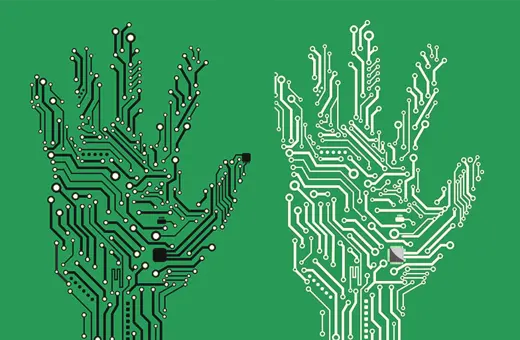From ChatGPT to Replika, AI is being touted as a tool to solve the loneliness epidemic. But is this just a false marketing promise, or perhaps something more sinister. In these habitually lonely times wanting someone to talk to, even if they’re just an AI chat bot, is understandable. But besides the emptiness of a conversation with an AI, author of Nihilism and Technology, Nolen Gertz, argues that even the most optimistic story of connection could lead to danger.
There is something disturbing and yet understandable about wanting to talk to a machine.
On the one hand, it could seem that wanting to talk to a chatbot demonstrates a preference for programs over people. People can talk back, making a monologue into a dialogue. Presumably then the desire to talk to a program rather than a person is precisely because of the desire to have a monologue rather than a dialogue, to have someone to talk at rather than talk with. A conversation with a chatbot is then not a conversation but a performance of something that looks like a conversation. Two players are seemingly involved in the conversation game, but really there’s only one player, like playing a game of catch with a brick wall. The ball bounces back to you, but the wall did not throw the ball, as instead it merely reflects back what it is put into it, a reflection that can give the appearance of a game of catch, especially if you do not understand geometry and so think the ball comes back to you more unpredictably than it really does.
 SUGGESTED READING
All-knowing machines are a fantasy
By Emily M. Bender
SUGGESTED READING
All-knowing machines are a fantasy
By Emily M. Bender
On the other hand, it could seem that wanting to talk to a chatbot need not be nefarious or misanthropic, but simply a new way to find out about the world and about ourselves. If conversations are a way to get outside of one’s experience by engaging with the experience of others, then the experience provided by chatting with a chatbot could be just as self-transcendent as the experience provided by chatting with a person. In fact, it could be even more so, as human conversation partners are typically more inclined to try to be polite and so possibly restrain themselves in order to avoid offense or confusion. Conversation with people could thus be seen as more conventional and rote than could be the case when talking to something that does not experience anxiety or shame. Likewise, we might feel less anxiety and shame when talking to a chatbot, and so, like talking to a baby or a cat, we might feel more able to open up to a machine. Consequently we might engage in acts of confession with a chatbot that we might not otherwise be able to experience with someone who we fear might not like what we are confessing. Cats, babies, and chatbots do not judge us for our sins, and so it makes sense to seek out non-judgmental conversation partners even if the conversations will of course be rather one-sided.





















Join the conversation